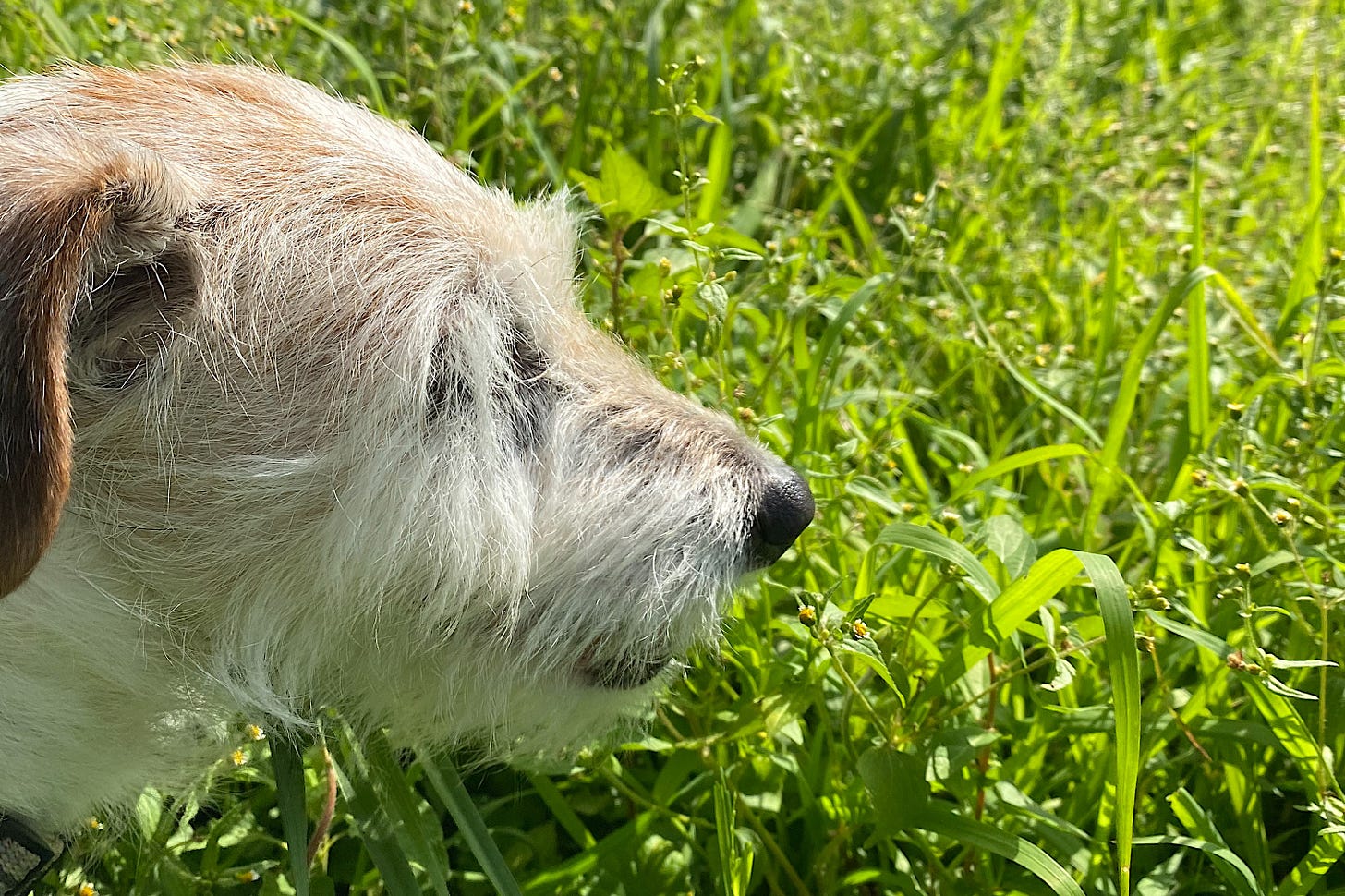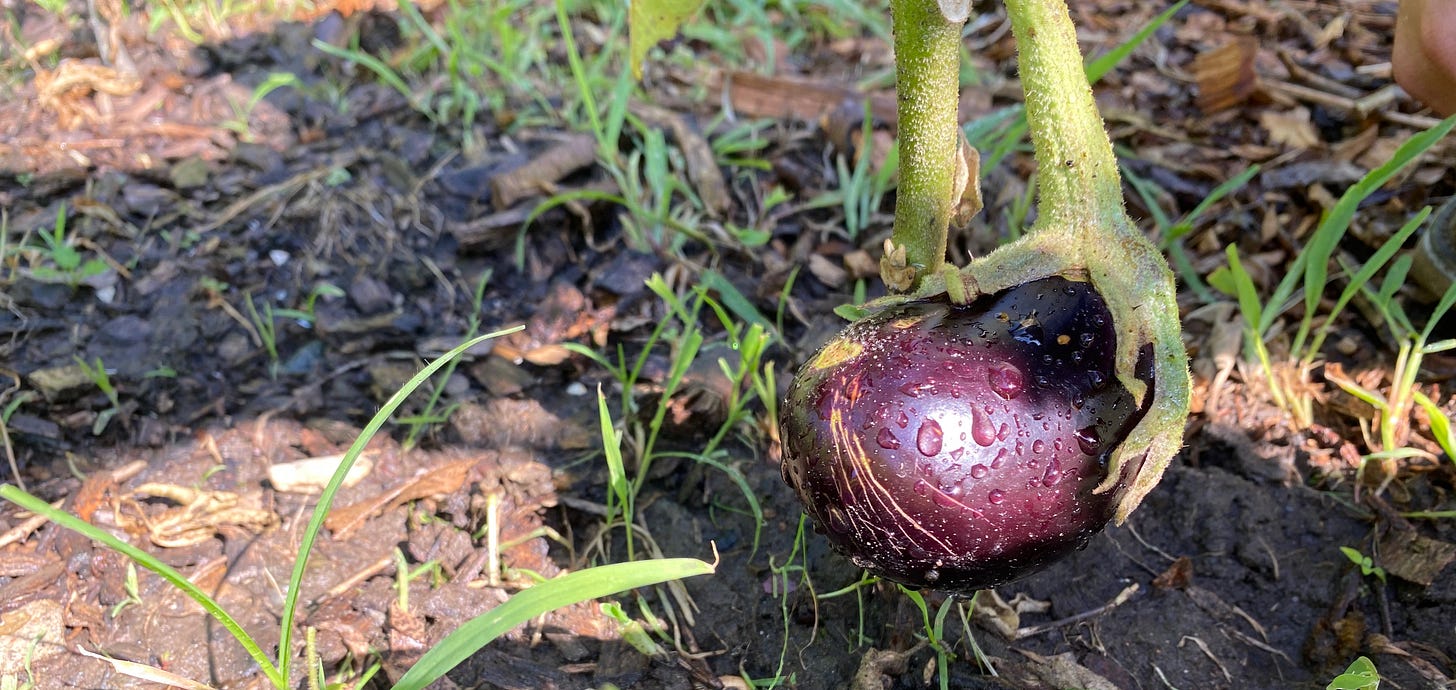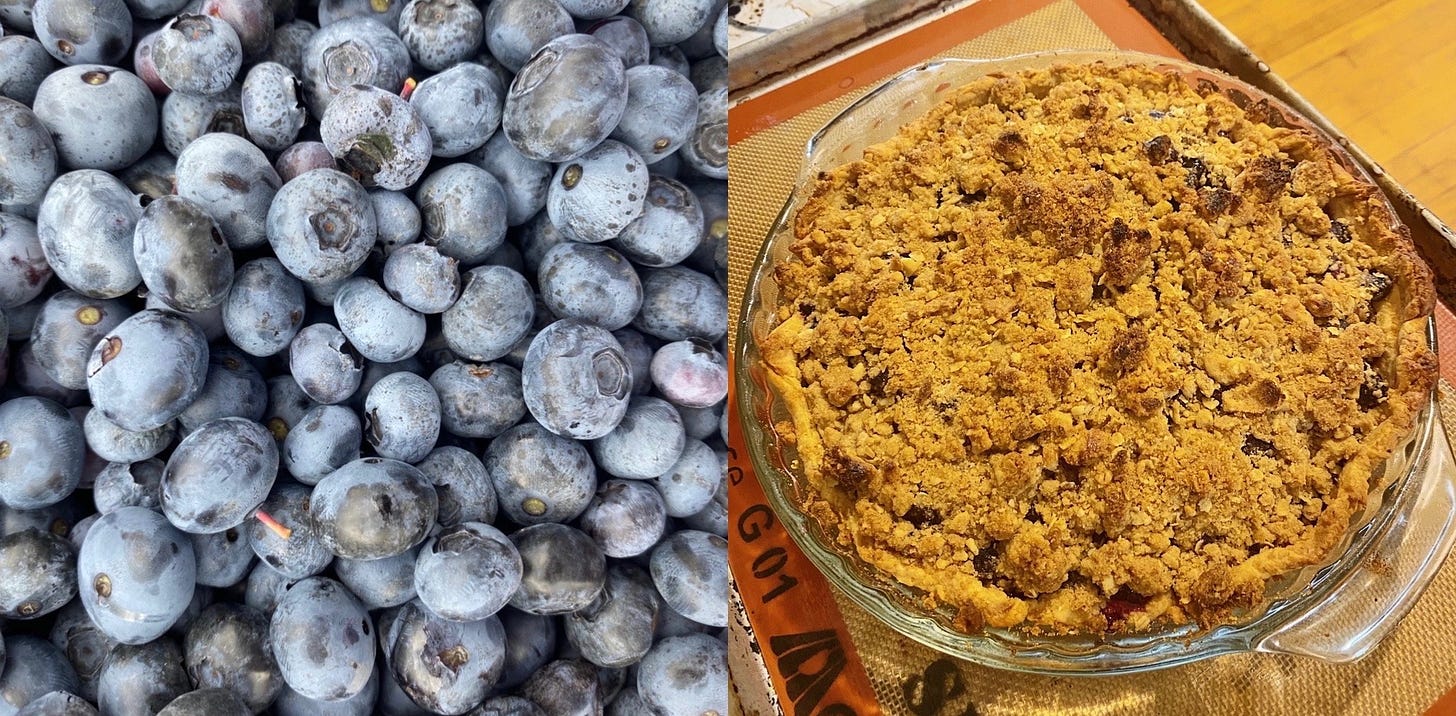Waking Up to Love
Some fragmented thoughts on Michigan summers, Fozzie's internal meteorologist, our struggles to listen and empathize, unusual tomatoes, and blueberry pie
The 57th Day after Coronatide*
Grand Rapids, Michigan
Hello, dear reader.
Earlier this week, Fozzie and I went to the garden to water and to harvest some pole beans and snap peas for dinner. A few white puffs of cloud helped emphasize just how blue the rest of the sky was, the air felt pleasantly dry, and the mercury hovered maybe a degree above 80. While I plucked peas—they’re almost done for the season, and I might leave the rest for seed—Fozzie sideswiped the bok choy and plowed through the nasturtium and munched on grass. He looked so happy!

Photo of Fozzie judging my negligence with the weeding of our community-garden plot
Days like these, which fade into cool and breezy evenings that summon you to the front porch, have sold us on Michigan summers. (If they’re not all like this, I don’t want to know.) Days like these make Fozzie come vibrantly alive too. He can walk for miles—and he’ll happily sit in the sun on the front lawn for a long time. We’re not sure what he thinks he’s doing. Guarding us? Tanning? Watching the world go by?
We’ve gotten to know the informal meteorologist who lives inside Fozzie’s body. If rain is en route, Fozzie grows visibly lethargic. On wet days, we’ll get him all harnessed up for a walk and open the front door; he’ll peer out and turn right back around and head toward the couch. We don’t know how old Fozzie is—estimates range from eight to twelve, and, look, I’m not terrific at math, but that’s a pretty broad range. We suspect he might have canine arthritis. Humidity and low barometric pressure could be teaming up to do a number on his joints.
From all this talk of weather and achy joints, you might think this week’s letter is about the 80-year-old man that has lived inside of me since childhood. Well, there would be no fresh insight in that. Instead, I’ve been thinking about what I’m learning from Fozzie about listening, about empathy, and about love.
We so easily dismiss what others say because it doesn’t seem important to us. Fozzie reminds me to contextualize what stories people choose to tell and what information they choose to share. We don’t know much about his past. Also, he’s a dog, and we don’t speak dog—and he’s a deaf dog, so he doesn’t communicate quite like hearing dogs. All that convicts me of the need to be attentive, too, to what he’s saying with his body. As my wise friend Nadia often asks, “What’s the thing behind the thing?”
Take, for instance, the weather. For all of my sentient life, I’ve hated small talk—stuff like talk of the weather. What Fozzie helps me to remember is that sometimes what I deem to be small talk isn’t so small at all. For Fozzie, the weather isn’t some insignificant thing, and the rain isn’t just pleasant white noise. It can be a source of real pain. For a farmer, the weather isn’t some small thing either; it can make the difference between flourishing and failure. If you regard inclement weather as a mere inconvenience rather than a real burden, that probably means you have others in your life who shoulder that burden for you.
I listen as best I can to Fozzie because I love Fozzie, and I empathize as best I can with Fozzie because I love Fozzie. But a love that limits itself to those closest to us isn’t a sufficient love at all.
Even as I say I subscribe to a faith that commands me to love my neighbors, I wonder how well I’m living that out by listening to them. Honestly, it still dismays me that, though I was required to do three semesters of coursework related to speaking and preaching, I was allowed to graduate from seminary without a single credit for listening. What is the cumulative toll of an educational system, of a society, that never learned to listen?
Even as I say I subscribe to a faith so founded on empathy that we believe God took on the body, experience, and emotions of humanity, I wonder whether I’m answering the call to empathy myself. To be attentive to others—to care for and about others, especially those whose perspectives and experiences have been different from mine and especially those whose voices have typically been disregarded or gone unheard—is to be attentive not just to what they’re saying but also to why they’re saying it. We ought to care simply because they care. What is the cumulative toll of a politics, of a society, that doesn’t prioritize empathy?
“The power of love, as the basis of a State, has never been tried,” Ralph Waldo Emerson writes in his essay “Politics.” What about as the basis of a society? Whenever I read the news, whenever I venture onto social media, whenever I hear the testimonies of friends, I’m reminded repeatedly that we’re severely lacking in listening skills, that we’re paying a woeful price for our chronic empathy deficit, and that the costs of our failures aren’t borne equally by all.
I don’t know how we find our way through this beyond a radical awakening to love. Indeed, I don’t know that a real “we” can come into existence without a radical awakening to love. While this might all sound corny, mawkish, and sentimental, the kind of love I’m talking about is precisely the opposite. It’s clear-eyed about our limitations, humble about our abilities, and utterly realistic about the state of things. And while this might strike some as naively optimistic, I’d choose a different word: Hopeful.
What I’m Growing: You want to know one reason I call myself a make-believe farmer? Well. I started most of my plants from seed this year, but I did buy a tomato plant from Blackbird Farms in nearby Coopersville. It was a variety called “Black King” that I did not have, and I thought Tristan, who especially loves tomatoes, would enjoy the diversity on the plate. Turns out we got more diversity than we bargained for: It was not a tomato at all! It’s an eggplant. I did think the leaves looked different from the other tomato plants, and it seemed shorter, but then I’m not one to condemn anyone or anything over a slightly different appearance or lack of height.

This is not a tomato.
What I’m Cooking: The words “grilled chicken” do not inspire confidence in me. They evoke flavorless breasts at endless conference banquets that have been drained of every bit of juice and cooked until tough. Then we found this recipe in the New York Times. Don’t overestimate my skills in the kitchen: We’ve got a great local butcher who does the spatchcocking for us. The marinade is really the magic: honey, red pepper flakes, oregano, lemon. We don’t even bother with the chickpea part of the recipe, I forgot to marinate the bird until about three hours before dinner, and because we’re impatient, we put the chicken on before the coals were as cool as the recipe calls for. In other words, this recipe is forgiving. Just have your meat thermometer handy. If you have any chicken meat left, it makes a superb, smoky chicken salad.
We went blueberry picking with our visiting friends last week, and we had over 12 pounds of berries to address. I froze about a third. Then we made blueberry pancakes and a small batch of blueberry jam (with cinnamon and freshly grated nutmeg). We sent some on the road with our friends when they left. “What should I do with all these blueberries?” I asked. Tristan, who had just said we’ve been eating too much, replied, “You could make a pie.” So I did, and it turned out great. I used my usual Sister Pie crust, blind-baked it at 400 for about 12 minutes, and filled it with berries (plus nutmeg, cinnamon, some lemon zest, and a bit of cornstarch). Then I topped it with walnut streusel—1/4 c each of whole-wheat flour, all-purpose flour, oats, chopped walnuts, light brown sugar, and butter, mixed until crumbly. Side note: Recipes always call for unsalted butter, but I just use salted, because… it tastes better? I baked the pie for about 40 minutes at 400.

What I’m Reading: Here’s an encouraging story about the Esselen Tribe of Monterey County, who have finally regained a (tiny) portion of their ancestral lands. I hope a reporter will be allowed to journey with the Esselen as they return to that land; it would make for a fantastic story. Also, over at The New Yorker, the British novelist Charlotte Mendelson has a delightful little riff on herbs.
What I’m Listening To: With its lovely echoes of Ecclesiastes, John Lucas’s “Time” has been a gentle companion and a regular encouragement for many months now.
I’m taking a break from Twitter for a while, but you can always find me on Instagram (@byjeffchu)—and Fozzie is there too (@fozziefozz).
Finally, a word of thanks to a reader named Ryan, whoever and wherever you are, for the Madcap gift card you sent! I’d thank you directly, but I haven’t got your last name or your email address or any other contact info.
Jeff
*Is Coronatide II a thing? On June 1, my governor, Gretchen Whitmer, lifted her stay-at-home order for Michigan. But this week, she announced the tightening of some restrictions because COVID-19 case numbers are creeping up and we basically can’t get our collective act together. Lord, have mercy.




You are 100% correct about Michigan summers! It is what makes Michigan winters tolerable. I grew up in Oklahoma and as a kid I remember reading books where the characters would be swimming during the day and then it would go on to mention the evening where they put on a sweater and sat around a campfire. I had no concept of cool summer evenings after a hot day. I thought that sounded glorious! The first time I experienced that in Michigan, I was so happy. So my perfect Michigan summer day is when it is warm enough to go to the beach during the day but as you sit outside in your backyard in the evening, you might just need to go grab a sweater!
I'LL BE THINKING ABOUT THIS PARAGRAPH FOR A LONG LONG TIME.
"Even as I say I subscribe to a faith that commands me to love my neighbors, I wonder how well I’m living that out by listening to them. Honestly, it still dismays me that, though I was required to do three semesters of coursework related to speaking and preaching, I was allowed to graduate from seminary without a single credit for listening. What is the cumulative toll of an educational system, of a society, that never learned to listen?"
THANKS JEFF.